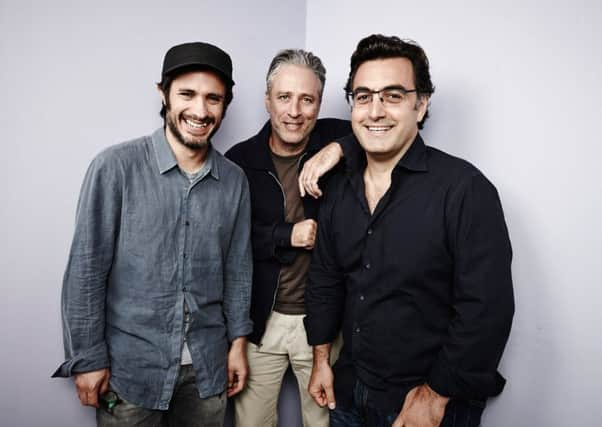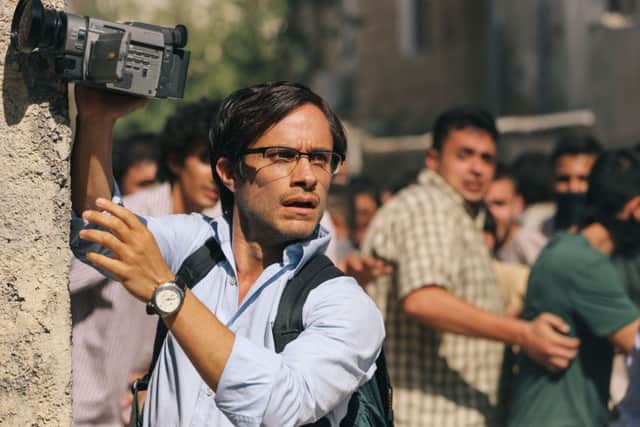Interview: Jon Stewart on his debut film Rosewater


‘Welcome to my medieval sex den,” booms Jon Stewart as he takes in his bizarre surroundings. The soon-to-be-ex-host of The Daily Show is sitting in the wicker-chaired and silk-sheeted cigar room of a plush hotel ahead of the London Film Festival premiere of his directorial debut. The locale seems oddly appropriate. Since directing Rosewater, an Argo-esque tale based on the true story of Newsweek journalist Maziar Bahari’s arrest and torture in Iran after reporting on the violent uprising that followed the disputed 2009 elections, Stewart has entered strange new territory.
More used to long, hectic days in New York producing, co-writing and hosting the satirical news show he’s fronted since 1999, he’s still getting used to the movie promotional treadmill and has had little time to do anything in London beyond eating lunch. “I had the risotto,” he says. “I’d never been to film festivals prior to doing this. And the one thing I’ve not been able to do is see any films.”
Advertisement
Hide AdHe won’t have time here either. Following the interviews he has lined up, he’ll attend the Rosewater premiere, then participate in an on-stage debate with Bahari, before flying back to New York the next morning to host that day’s edition of the The Daily Show.


Given that he’s starting to pull in different creative directions, though, it’s no surprise that he’s since chosen to relinquish the reins of The Daily Show. When I meet Stewart, this announcement has yet to be made, but we touch on whether stepping down has been something he’s been considering since directing Rosewater. “No, I really do view The Daily Show as the engine room,” he says. “The only thing that would decrease my participation there is an inability to evolve it properly, and nothing to do with greener grass. I wouldn’t want to stay there for the wrong reasons. I don’t just want to maintain it until it withers.”
Though he’ll make his final appearance on 6 August (handing over to South African comedian Trevor Noah), his impending departure already feels like the end of a remarkable era, one in which Stewart, in his capacity as a fake anchor on a satirical news show, has become one of the most trusted news voices in America.
As it happens, the absurdity of that development is reflected in the themes of Rosewater. Incarcerated for 118 days in Tehran’s Evin prison, Bahari’s ordeal (the journalist is played in the film by Gael Garcia Bernal) was in part catalysed by his participation in a sketch for The Daily Show designed to expose the ignorance of the Bush administration’s reductive characterisation of Iran as part of the Axis of Evil.
Ironically, after Bahari was arrested, his interrogator used the offending sketch, in which Bahari was interviewed by Daily Show “correspondent” Jason Jones (who was pretending to be a spy), as evidence that Bahari was a spy for the West. “It was truly ludicrous,” says Stewart. “I think you’d be hard pressed in any scenario to think that might get you in trouble. It was just so stupid.”
Did he feel responsible? Is that why he wanted to make the film? “Not really,” he says. His decision to write and direct Rosewater grew out of his subsequent friendship with Bahari and their efforts to stimulate Hollywood interest in Bahari’s memoir, Then They Came For Me. As for feeling personally responsible, he says that’s tricky. “What we did was nothing, what Maziar did was nothing. He wasn’t actually a spy. Our interview with him was not actually part of a conspiracy. When a country weaponises the banal, or the innocuous, or idiocy, you try to think to yourself, ‘What could we have done differently’, and the answer is nothing.
Advertisement
Hide Ad“We thought a lot about it,” he adds, “and what he really got in trouble for was witnessing atrocity. And I guess my point is, what we could have done differently is not have anyone witness atrocity. And that’s not an option.”
As one might expect from Stewart, the film is much funnier than its harrowing subject matter suggests. As one might also expect, it has been denounced in Iran, with Stewart accused of being an agent for Mossad and the CIA. “I expect nothing but absurdity anyway, so I don’t take that too seriously,” he says.
Advertisement
Hide AdHe’s also used to having detractors. “I get it sometimes walking home. It’s not like I’m unaccustomed to it. You don’t perform in clubs, you don’t host the Oscars a couple of times, without people drawing moustaches on your face and kicking you in the nuts. That being said, I do take seriously trying to work as hard as I can to have clarity of vision. But I also try to be flexible enough to recognise that I don’t know everything and to draw in what I think is constructive and to block what I think is disruptive.”
Stewart hasn’t fallen into the trap of believing his own press – of which there has been plenty. A 2008 New York Times profile, for instance, proclaimed him “the most trusted man in America” and, prior to running for president, Barack Obama told Stewart in an interview: “The only person more hyped than me is you.”
Stewart shrugs this off when I mention it, theorising that the reason he can seem like a more rational voice than mainstream news correspondents or pundits is because the news media is “incentivised by extremity and conflict”.
“Imagine you have a channel and it’s 24 hours of news,” he says. “The truth is, maybe only seven minutes of news happens in a day, so they have to expand that. Their platforms are built for catastrophe: for 9/11, for an earthquake. In the absence of that, they’ll try and chin-up anything so it has that urgency. The system is incentivised by that type of crazy, so anybody else who walks into that universe, who doesn’t function on that type of currency, will appear like a normal person.”
Stewart’s ascendency had a lot to do with being the right guy in the right place at the wrong time. Arriving at The Daily Show just ahead of the Bush administration, 9/11 and the War on Terror, his ability to unpack the absurdity of those dark days with jokes became a palliative for anyone watching the regular news in disbelief at what was happening.
Rosewater’s capacity to find light in the darkness, then, can be traced to the work he’s done on The Daily Show. But Stewart doesn’t go in for heavy-handed attempts to analyse the origins of his need to crack wise. He didn’t “suffer” in his childhood; there are no dark psychological roots to his outlook. It’s mostly “wiring”, he says. “Some people process information in a linear fashion, some process it through their art. I’m generally wired to favour pratfall and pun.”
• Rosewater is on general release from Friday